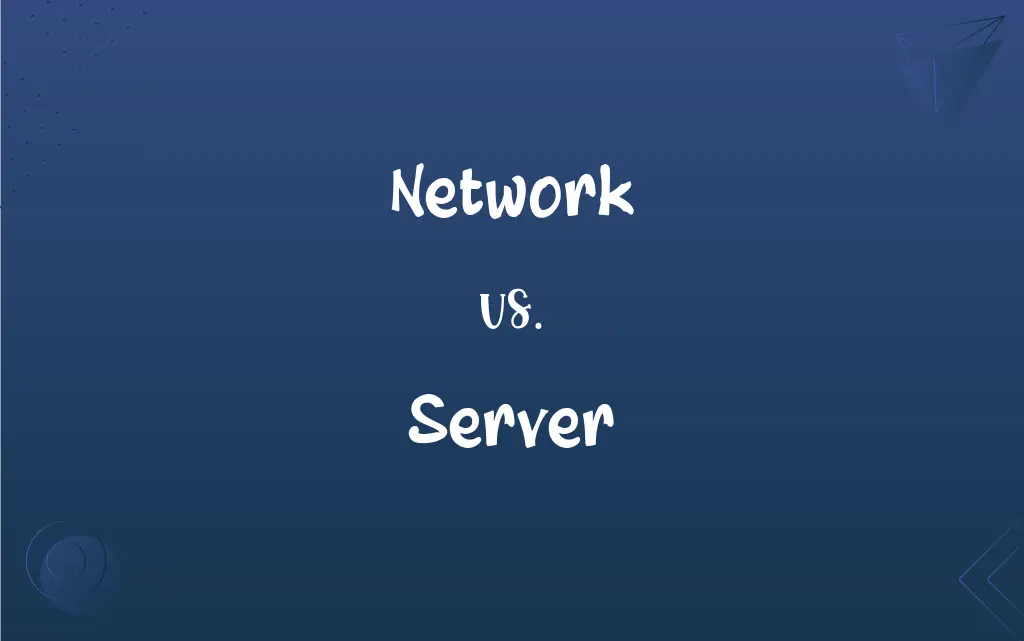Network vs. Server: What's the Difference?
Edited by Aimie Carlson || By Harlon Moss || Updated on July 11, 2024
Network is a set of interconnected computers/devices sharing data and resources. Server is a system providing resources, data, services, or programs to other computers, known as clients, over a network.

Key Differences
Network essentially refers to a collection of computers, servers, mainframes, network devices, and other devices that are linked together to share data and resources. A network allows for data transmission across shared channels, permitting system users to communicate and share resources like files, applications, and internet access. Conversely, a Server is specialized hardware or software designed to provide functionality for other programs or devices, known as "clients." The client-server model represents how data and service requests travel across a network, with the server operating as the central locus for data and resource management.
In a Network, devices communicate through interconnected physical or wireless links, ensuring seamless data transmission and connectivity among devices. A network's complexity and scalability might vary, covering a small local area (LAN) or spanning across cities, states, or even countries (WAN). Importantly, networks can incorporate various devices, including servers, computers, and routers, working conjointly to assure fluid communication and data exchange.
Servers, in the context of network management, ensure that client devices access, retrieve, and utilize resources effectively. Servers undertake the heavy-duty processing of managing applications and services centralized within a network, thereby significantly affecting a network's efficiency and performance. These could be mail servers, application servers, or database servers, each with their specific role and functionality, all crucial to maintaining a fluid and functional network structure.
Notably, Network administration involves managing and ensuring the interconnected devices, including servers, computers, and network devices, operate efficiently, safely, and cohesively. The network infrastructure might use various protocols and technologies to facilitate robust communication, safeguarding the data integrity and availability shared across the entire network.
Server management, by contrast, focuses on maintaining, updating, and safeguarding servers, ensuring they effectively serve and manage client requests. Server administration encompasses monitoring server performance, installing updates, ensuring security protocols are enforced, and managing data storage and retrieval, crucial for optimal server and, subsequently, network performance.
ADVERTISEMENT
Comparison Chart
Definition
A system of interconnected devices
A device or system that provides resources to other devices
Functionality
Enables devices to communicate and share data
Manages and provides data/services to client devices
Components
Includes servers, computers, routers, etc.
Can be a dedicated hardware device or software on a networked machine
Administration
Concerned with managing connectivity among devices
Focused on ensuring effective data storage, retrieval, and management
Types
Classified into LAN, WAN, MAN, etc.
Includes web servers, database servers, mail servers, etc.
ADVERTISEMENT
Network and Server Definitions
Network
A structured system of interconnected devices and computers.
The company’s network connects computers across all branches, enabling seamless communication.
Server
A software managing internet content and website hosting.
The web server hosts several websites, making them accessible via the internet.
Network
A configuration enabling internet access to multiple devices.
My home network allows all family members to access the internet simultaneously.
Server
A program managing access and use of a centralized resource or service.
The email server ensures that all our emails are sent and received properly.
Network
A broadcast system linking stations for simultaneous content sharing.
The news was broadcast nationwide through a network of local stations.
Server
A device or system managing network databases.
The database server holds the company’s client information securely.
Network
A group interconnected for professional or social purposes.
The business network gathers monthly to discuss industry trends.
Server
A powerful computer managing network resources.
The server crashed, rendering the website inaccessible for an hour.
Network
A group or system connected for the purpose of communication.
Social media platforms are networks that connect people globally.
Server
A system providing resources and data to other computers.
The server stores all our important company files and documents.
Network
An openwork fabric or structure in which cords, threads, or wires cross at regular intervals.
Server
One who serves food and drink. See Usage Note at waiter.
Network
A system of lines or channels that cross or interconnect
A network of railroads.
Server
Something, such as a tray, that is used in serving food and drink.
Network
A complex, interconnected group or system
An espionage network.
Server
An altar server.
Network
An extended group of people with similar interests or concerns who interact and remain in informal contact for mutual assistance or support.
Server
(Law) One who serves a legal process, such as a summons or court order.
FAQs
What is a Network in computing?
A network refers to a collection of interconnected computers and devices that communicate and share resources.
What is a Server Farm or Data Center?
A server farm or data center is a facility housing multiple servers, providing substantial computing power and storage, often utilized for large-scale data processing and management.
How does a Server function within a Network?
A server provides resources, data, and services to other computers (clients) within a network, managing requests and facilitating functionality.
What are LAN and WAN in networking?
LAN (Local Area Network) is a network in a small geographical area, while WAN (Wide Area Network) spans across broader geographical regions.
How do Network administrators ensure network stability and reliability?
Network administrators ensure stability through continuous monitoring, managing data traffic, securing networks, and routinely updating hardware and software.
Can personal computers be set up as Servers in a Network?
Yes, personal computers can be configured to act as servers in a network, managing resources and data for other networked devices.
What is Network Topology, and how does it affect Server accessibility?
Network topology refers to the arrangement of different elements (links, nodes, etc.) in a computer network. It influences data transfer speed, reliability, and how easily servers can be accessed within the network.
What’s the role of a Database Server within a network?
A database server stores, retrieves, and manages data in databases, responding to database queries from client machines within a network.
What role do routers and switches play in a Network?
Routers and switches facilitate data transmission across networks, with routers directing data traffic and switches enabling device connectivity within a network.
How do servers handle user requests on a website?
Servers receive user requests, process them (which may involve fetching or storing data), and then send the relevant data or confirmation back to the user's browser.
What is a VPN in a network?
VPN (Virtual Private Network) is a secure network connection over the internet, allowing safe data transmission through encrypted channels.
Can a Network function without a Server?
Yes, in peer-to-peer (P2P) networks, computers can interact directly without needing a central server, sharing resources among themselves.
What is Cloud Server and how is it different from a traditional Server?
A cloud server is a virtual server available through cloud computing environments, providing scalable resources on-demand, contrasting with traditional servers which have physical hardware limitations.
Can a computer act as both a part of a Network and a Server?
Yes, a computer can be part of a network and also function as a server, providing resources to other networked devices.
What are the different types of Servers?
Servers can be varied, such as web servers, database servers, and mail servers, each serving different purposes within a network.
How is data security managed on a Server?
Data security on servers is managed via various measures like firewalls, encryption, and secure socket layers, ensuring safe data storage and transmission.
How are networks and servers involved in IoT (Internet of Things)?
In IoT, networks enable interconnected IoT devices to communicate, while servers manage data storage, processing, and assist in analyzing data from these devices.
What are the potential risks to a Network and Server?
Risks can include cyber-attacks, data breaches, hardware failures, and software vulnerabilities, all of which can impact network and server functionality.
Why is a Network important for businesses and organizations?
Networks enable seamless communication, data sharing, and resource allocation among interconnected devices, enhancing operational efficiency.
Why might a Server crash, and what impact does it have on a Network?
Servers might crash due to hardware failures, software bugs, or overloading. This can disrupt network services, hindering data access and functionality.
About Author
Written by
Harlon MossHarlon is a seasoned quality moderator and accomplished content writer for Difference Wiki. An alumnus of the prestigious University of California, he earned his degree in Computer Science. Leveraging his academic background, Harlon brings a meticulous and informed perspective to his work, ensuring content accuracy and excellence.
Edited by
Aimie CarlsonAimie Carlson, holding a master's degree in English literature, is a fervent English language enthusiast. She lends her writing talents to Difference Wiki, a prominent website that specializes in comparisons, offering readers insightful analyses that both captivate and inform.































































